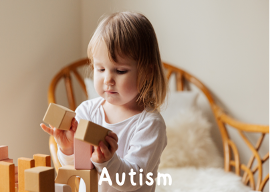
Therapy for Autism
Autism is a neurological, neurodevelopmental disorder causing challenges with social skill. Children with autism may demonstrate repetitive or odd behaviors, have speech or be nonverbal, have sensory seeking or avoiding behaviors, have feeding issues, difficult behaviors, motor challenges and may have retained primitive reflexes.
Facts about Autism
- Prevalence: It is estimated that around 1 in 54 children in the United States has been identified with ASD as of January 2022.
- Early Signs and Diagnosis: Signs of autism can often be observed in early childhood, usually before the age of 3. Early diagnosis and intervention are crucial for better outcomes. Diagnosis is based on behavioral observations and developmental history and questionnaires.
- Autism is usually diagnosed between 2 and 3 years of age, but signs often appear earlier. If you have concerns, speak with your pediatrician and seek out a local developmental pediatrician sooner rather than later. Many Autism clinics only provide diagnosis under a certain age.
- Social Challenges: Individuals with autism may struggle with understanding social cues, making eye contact, and forming relationships. Communication challenges in particular are noted delayed speech development and difficulty with receptive language skills like understanding what is being said.
- Intellectual and Developmental Diversity: Autism is associated with a wide range of intellectual and developmental abilities. While some individuals with autism have intellectual disabilities, others may have average or above-average intelligence.
- Treatment Approaches: There is no cure for autism, but various interventions and therapies can help manage symptoms and improve quality of life. Applied Behavior Analysis (ABA), speech therapy, occupational therapy, and social skills training are common therapeutic approaches.
- Therapy for a child with Autism can take on many shapes and forms depending on the areas that are being addressed. Often children will receive services for speech and language, occupational therapy and physical therapy. They may also benefit from AAC, feeding and sensory therapy.
We approach each person with autism as an individual with unique strengths and skills. This perspective and understanding is crucial in providing support to not only the child but family as well.
If you’d like to request a free screening or begin therapy for your child who has been diagnosed with Autism, call our office today to get the process started.